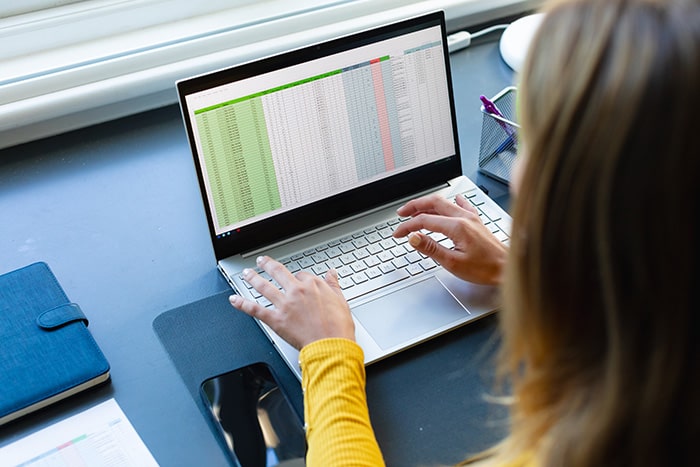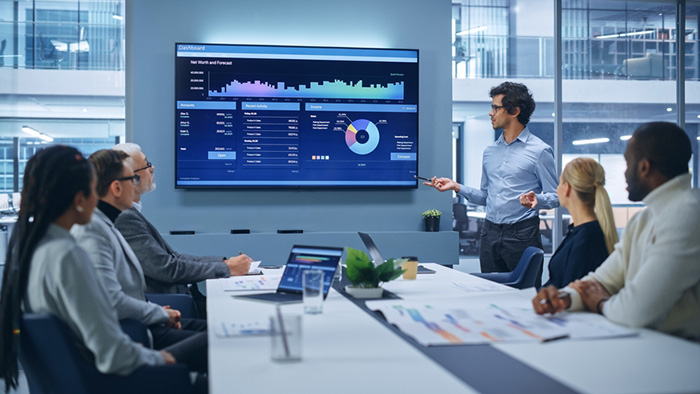Running a small business in the UK is an exciting adventure. But when it comes to managing your finances, things can quickly turn into a spreadsheet nightmare. Small business accounting software can revolutionise the way you handle your finances, offering a user-friendly platform to automate tasks, streamline bookkeeping, and gain valuable insights.
But with so many options available, choosing the right accounting software can feel overwhelming. This guide will equip you with everything you need to find the best small business accounting software in the UK for your needs.

Do I Need Accounting Software For My Small Business?
If you’re struggling with traditional bookkeeping methods, accounting software could be a game-changer. Here are some signs that it’s time to consider this helpful tool:
- You spend hours manually entering data. No more manual data entry because these software tools have automated features that save you precious time.
- Accuracy is a constant concern. Human error is inevitable, and accounting software can help minimise mistakes by making sure calculations are always correct.
- Generating reports takes a long time. Gain valuable insights and understand your financial performance through easy-to-read reports generated by the software.
- You’re constantly chasing overdue invoices. Automate invoice creation and send reminders to clients, streamlining your cash flow management.
- You simply want to free up time. Focus on your core business activities while the software handles the nitty-gritty of bookkeeping.
Accounting software isn’t just about managing accounts; it offers a range of features to help your business grow, including:
- Effortless expense tracking: Categorise expenses, capture receipts with your phone, and stay on top of your spending.
- Simplified invoicing and payments: Create professional invoices, accept online payments, and track invoice status with ease.
- Inventory management (for some software): Keep track of stock levels, receive low-stock alerts, and streamline your inventory control (particularly relevant for retail businesses).
- Payroll processing (for some software): Manage payroll efficiently, calculate taxes, and ensure employees are paid on time (may require additional features or integration).
- Powerful reporting and analysis tools: Gain valuable insights into your financial health with clear reports and visual dashboards.
While accounting software offers significant benefits, it’s important to consider potential downsides:
- Cost: Depending on the features and functionalities you need, there can be associated costs. However, the time saved and increased efficiency can often outweigh the initial investment.
- Learning curve: Some software may require a bit of time to learn and manage. Look for options with user-friendly interfaces and readily available tutorials.
- Security concerns: Choose a software provider with robust security measures to protect your financial data.
Remember, accounting software is a powerful tool, but it’s not a substitute for seeking professional accounting advice when needed. DASA Accountancy offers a comprehensive range of accounting services to help you manage the complexities of managing your finances.
Top 5 Recommended Accounting Software For Small Businesses In The UK
It could be frustrating trying to find the best accounting software for small businesses in the UK. To help you choose the best, here are some of the best options:
1. QuickBooks Online
QuickBooks is another top contender in the UK market. It’s known for its robust features and excellent reporting capabilities.
Key features:
- Invoicing and payments
- Expense tracking
- VAT management
- Payroll (additional cost)
- Cash flow forecasting
Pricing: Starts from £12 per month (excluding VAT)
Best for: Businesses that need strong financial reporting and tax management features.
2. Xero
Xero is a popular choice for many UK small businesses, and for good reason. It’s user-friendly, feature-rich, and integrates well with many other business tools.
Key features:
- Bank reconciliation
- Invoicing
- Expense claims
- Project tracking
- Inventory management
Pricing: Starts from £12 per month (excluding VAT)
Best for: Businesses looking for a comprehensive, user-friendly solution with good scalability.
3. FreeAgent
FreeAgent is designed specifically for small businesses, freelancers, and contractors in the UK.
Key features:
- Automated bank feeds
- Time tracking
- Project management
- Multi-currency support
- Tax forecasting
Pricing: Starts from £19 per month (excluding VAT)
Best for: Freelancers, contractors, and small businesses looking for an all-in-one solution.
4. Sage
Sage is a well-established name in UK accounting software. It offers solutions for businesses of all sizes, including small businesses.
Key features:
- Invoicing and quotes
- Bank reconciliation
- VAT returns
- Cash flow forecasting
- Stock management
Pricing: Starts from £12 per month (excluding VAT)
Best for: Businesses that may need to scale up to more complex accounting systems in the future.
5. Wave
Wave is a free accounting software option that’s gaining popularity among very small businesses and freelancers
Key features:
- Unlimited income and expense tracking
- Invoicing
- Receipt scanning
- Basic financial reporting
Pricing: Free (with paid add-ons available)
Best for: Very small businesses or freelancers on a tight budget who need basic accounting features.

Choosing The Right Accounting Software For Your Business
When selecting the best small business accounting software in the UK, consider the following factors:
- Your Business Needs: Think about what features are must-haves for your business. Do you need inventory tracking? Multi-currency support? Payroll integration? Make a list of your non-negotiables.
- Ease of Use: If you’re not an accounting expert, you’ll want software that’s intuitive and easy to manage. Look for options with good user interfaces and helpful tutorials or support resources.
- Scalability: Consider your business growth plans. Will the software be able to handle your needs as your business expands? Can you easily upgrade to more feature-rich versions?
- Integration Capabilities: Check if the software integrates with other tools you use, such as your e-commerce platform, CRM system, or payment processors.
- Mobile Access: IBeing able to access your accounts on-the-go is a great benefit. Look for software with good mobile apps.
- Pricing: Consider your budget, but remember that cheaper isn’t always better. Think about the value you’re getting for your money.
- Support: Good customer support can be crucial, especially when you’re just getting started. Check what kind of support each provider offers.
- Security: Your financial data is sensitive. Make sure the software you choose has strong security measures in place.
The Role Of An Accountant
While good accounting software can handle many tasks, it doesn’t replace the value of a qualified accountant. Here’s where an accountant can still help:
- Software selection and setup: An accountant can help you choose the best software for your needs and make sure it’s set up correctly.
- Tax planning: Accountants can provide valuable advice on tax-efficient business structures and strategies.
- Financial analysis: While software can generate reports, an accountant can help you interpret them and make strategic decisions.
- Complex transactions: For more complicated financial matters, an accountant’s expertise can be invaluable.
- Compliance: An accountant can help make sure you’re meeting all your tax and financial reporting obligations.
At DASA Accountancy, we work with various accounting software platforms and can help you choose and implement the best solution for your business. Get in touch with today, and let’s work together to find the best accounting solution for your business.
FAQs
Most software allows data export, but the ease of switching depends on your data complexity and the compatibility between systems.
No, most modern accounting software combines both bookkeeping and accounting functions in a single package.
Yes, most software offers multi-user access with different permission levels, though this may require a higher-tier plan.
Many packages include year-end closing features and can generate necessary reports for tax filings.
Some accounting software includes basic inventory tracking, while others offer more advanced inventory management as an add-on.
Yes, even sole traders benefit from using accounting software to streamline their finances, track income and expenses, and prepare tax returns.




